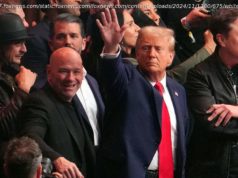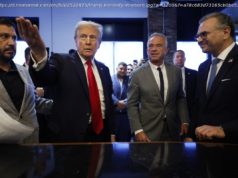Alarm over North Korea’s intercontinental ballistic missile tests, a germinal step to temper South China Sea disputes and unease over a disastrous siege by pro-Islamic State group…
MANILA, Philippines (AP) — Alarm over North Korea’s intercontinental ballistic missile tests, a germinal step to temper South China Sea disputes and unease over a disastrous siege by pro-Islamic State group militants will grab the spotlight in an annual gathering of Southeast Asia’s top diplomats with their Asian and Western counterparts.
The 27 nations deploying their foreign ministers for three days of summitry and handshake photo-ops in Manila starting Saturday include the main protagonists in long-tormenting conflicts led by the United States, Russia, China, Japan and South and North Korea.
The Philippines plays host as this year’s chairman of the Association of Southeast Asian Nations, or ASEAN. It’s an unwieldy 10-nation collective of democracies, monarchies and authoritarian regimes founded half a century ago in the Cold-War era, which prides itself for being a bulwark of diplomacy in a region scarred by a history of wars and interminable conflicts.
A look at the main issues expected to dominate the meetings:
___
SOUTH CHINA SEA
Chinese and ASEAN foreign ministers will endorse a two-page framework of a long-sought code of conduct in the disputed South China Sea when they meet on Saturday. The Philippines calls the development a major diplomatic progress in efforts to ease a potential flashpoint.
Critics say the agreed outline of key principles is lopsidedly in China’s favor and suspect that Beijing may have consented to it to divert protests as it tries to complete land reclamations and fortify its man-made islands with a missile defense system.
While the framework carries hope for a diplomatic approach to the disputes, it noticeably failed to mention China’s construction of new islands and an arbitration ruling last year that invalidated the historic basis of Beijing’s claim to virtually the entire sea, a strategic waterway for commerce and defense. China has dismissed the arbitration ruling, which was put forward by the Philippines, as a sham.
Backed by its treaty ally the United States, the Philippines was the most vocal critic of China’s assertive actions in the contested region until President Rodrigo Duterte rose to power last year. He swiftly moved to rekindle ties with Beijing in the hope of boosting trade and securing infrastructure funding while indefinitely sidelining efforts to secure Chinese compliance with the ruling.
Beijing’s cozier ties with Manila under Duterte have calmed tensions and prompted China to allow Filipinos back to a disputed shoal, but arbitration proponents worry that Duterte was squandering an opportunity to harness the rule of law to restrain aggressive acts in the disputed region.
A draft of a joint communique to be issued by the ASEAN ministers welcomes the conclusion of talks on the framework, but drops any mention of regional concerns over land reclamations and militarist moves in the South China Sea, which ASEAN members had agreed to include in their previous statements.
___
NORTH KOREA
Following North Korea’s two recent and successful ICBM tests, the U. S. and its allies quickly signaled their intention to impose additional sanctions against Pyongyang through a U. N. resolution. Along with South Korea and Japan, the U. S. is also expected to lead a barrage of condemnations against Pyongyang at the ASEAN Regional Forum, an annual security conference to be held in Manila on Monday. North Korea has confirmed that its top diplomat, Ri Yong Ho, will attend, raising the specter of a verbal showdown in the 27-nation forum, which also includes Pyongyang’s ally, China.
Ahead of the meeting, a senior State Department official told reporters in Washington that the U. S. was moving to have North Korea suspended from the ARF for going against its conflict-prevention objectives. It’s part of America’s broader effort to isolate Pyongyang diplomatically and force it to end missile tests and abandon its nuclear weapons program.
Removing North Korea from the grouping, however, will be tough. There is no exclusion procedure and the ARF decides by consensus, so any U. S. move against Pyongyang can be defeated by any country, including China.
«I think what we would expect to see this year at the meeting would be a general chorus of condemnation of North Korea’s provocative behavior and pretty serious diplomatic isolation directed at the North Korean foreign minister, » said Acting Assistant Secretary for East Asian and Pacific Affairs Susan Thornton.
In Manila, the ARF ministers will express their grave concern over the North’s ICBM testing, along with previous missile launches and two nuclear tests in 2016. They will repeat calls for Pyongyang to immediately comply with its obligations under U. N. resolutions and ask that it exercise self-restraint «in the interest of maintaining peace, security and stability in the region and the world, » according to a draft statement to be issued by the Philippines, as ARF chairman.
The North would respond by claiming «during the meeting that its nuclear weapons program is an act of self-defense against a hostile policy towards it, » the draft statement said.
___
MARAWI SIEGE
The ASEAN meetings are held under heavy security in Manila as thousands of Philippine troops press a major offensive to finally quell a siege by Islamic State group-linked militants that has dragged on for more than two months in southern Marawi and turned large swaths of the lakeside city into a smoldering battlefield. The fighting has left nearly 700 combatants, including more than 520 gunmen, and civilians dead and displaced the entire population of the mosque-studded city.
The Marawi crisis has triggered concerns that the Islamic State group may be gaining a foothold in Southeast Asia through allied local militants, as it faces major setbacks in Syria and Iraq.
At the ARF, the ministers were to strongly condemn «recent acts of terrorism» without mentioning Marawi by name and reiterate their commitment to counterterrorism strategies, according to the draft ARF communique.






